CAFOD Lent Fast Day Friday 6th March
The Jesuit Theologian, Rev Jon Sobrino tells us that ‘To believe in God is not just to love life but to work so that there is life’
. As we move through Lent towards celebrating the time when our Lord put his life on the line for us so that we may have ‘Life in all its fullness’
(John 10:10) we would do well to reflect deeply on how we might live this out in our daily lives. At home many are beginning to feel the pinch as the credit crunch and recession take their toll. As some lose their jobs and wages are lowered, many people are expected to do more for less whilst there are those who seem to be financially immune and even make profits out of the predicament and misery of others. This brings me back to the two quotes at the beginning. What might it mean to work so that there is life? And what does Jesus mean by ‘Life in all its fullness’?

‘Life in all its fullness’ conjures up in my mind a world where people of all abilities, nationalities, faiths and political persuasions are given the opportunities to have somewhere they can call home, a job that will provide for their needs and the needs of those dependent upon them, an education, access to health care, a staple diet, clean, safe drinking water, to live in peace and security, to be cared for and loved throughout their lives no matter how good or bad their health may be, good stewardship of the earth’s resources and environment, to be of service to others, time to think, pray and reflect and that people uphold the sanctity of life. For so many both here, in our own communities and overseas in the developing world, what I have just described is a very long way from their daily reality.
Working to bring these about for all people is what I think is behind both Jon Sobrino’s and Jesus’ statements. I suppose, the situation described above may seem to be that of a Utopia and yet I feel, most of us believe that we should be working to bring about such a world. But how can people have ‘Life in all its fullness’ if their lived reality is one of continuing anxiety about how much they will earn, how many material things they can posses, if they will have enough to eat or a roof over their heads? There are two sides to this coin. One is the concerns of the well-off and how they can increase or maintain their wealth and the other is the concerns of the poor and marginalised about whether they will have enough food, a home, clothing, education, water. It is these kind of questions that CAFOD is attempting to address through its development work overseas and through its awareness raising here at home in the form of livesimply, in solidarity and sustainably. There is still much more we can do about this in our parishes, communities, homes and work places. Over the next year CAFOD will be putting emphasis on climate change and the impact that our lifestyles are having on people in the developing world.
The clear message from Fr Sobrino appears to be that we cannot possibly live out the Gospel if we do not have an active care and compassion for those who are in need. This Lent, may we seek to enable people to live ‘Life in all its fullness’ through our responsibility towards them.
Focus on Cambodia

CAFOD’s Lent Fast Day focuses on the country of Cambodia – a country of extremes – its natural beauty and world famous temples have led to a boom in tourism, but scratch below the surface and you find entrenched poverty. Almost one in three of Cambodia’s 14 million population lives on less than US$0.45 a day, making it one of the poorest countries in Asia. Spiralling inflation has meant a sharp rise in food prices, and many poor communities have been forced from their land by property investors, leaving them with no way to grow food or make a living. The legacy of the brutal Khmer Regime in the 1970s is still evident as services such as healthcare, education and housing continue to suffer and the country is largely reliant on overseas aid. Cambodia is rich in natural resources such as oil, gas and timber. Exploitation of these is devastating the environment, and widening the gap between the rich and the poor.
CAFOD works with local partners focusing on HIV and AIDS, land issues, women’s empowerment, and governance. Together, CAFOD and local charity Maryknoll are helping to improve life for Cambodia’s next generation by offering young people, orphaned by AIDS, a family home and the chance to finish their education. Phalla, a social worker and foster parent with Maryknoll tells us, ‘My job involves visiting people with HIV or AIDS, making sure their health is stable and their children are getting an education. I usually visit about 10 families a day. In Cambodia fostering is a relatively new idea. Traditionally, extended families took in any orphaned children but now, with the impact of AIDS and poverty this is often not possible. The children we care for are surrounded by the love of their brothers and sisters’.
Phalla has five children of her own and eight foster children. Through her life she is working ‘So that there is life’ and the children and families she cares for may have ‘life to the full’. She does this because she cares. But she couldn’t raise her large family without your support. Please continue to give generously this Fast Day. Thank you for your ongoing support and prayers.
